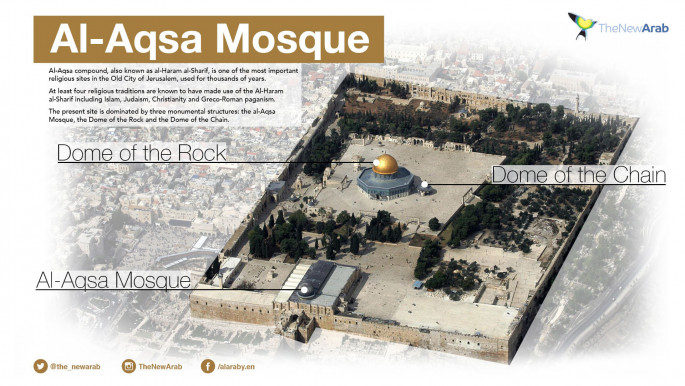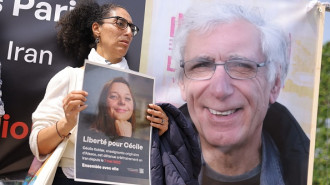Fatal clashes after Israeli forces attack Palestinian al-Aqsa protests
One Palestinian was shot dead by Israeli settler gunfire in the al-Tur neighbourhood of east Jerusalem, according to the Palestinian health ministry.
A second Palestinian was killed by gunfire in east Jerusalem's Ras al-Amud neighbourhood, while a third was shot dead in Abu Dis in the occupied West Bank, the ministry said, without providing details on the circumstances.
Nearly 400 others were injured in clashes across the West Bank, with injuries ranging from live bullet wounds to burns, according to the Palestinian Red Crescent.
Clashes between Israeli security forces and Palestinians erupted after Israeli police had barred men under-50 from entering the Old City for Friday Muslim prayers.
Israeli forces reportedly attacked a protest held by Palestinians.
The clashes came as tensions heated and protests erupted over the new security measures at al-Aqsa Mosque.
The rare ban came after Israeli ministers decided not to remove metal detectors erected at entrances to the Haram al-Sharif mosque compound, known to Jews as the Temple Mount
It follows an attack outside the compound a week ago that saw three Palestinians and two policemen killed.
"Entry to the Old City and Temple Mount will be limited to men aged-50 and over. Women of all ages will be permitted," a police statement said.
Police said later in the day that discretion could be applied in the use of the metal detectors instead of forcing everyone to go through them.
Protests
But Palestinian and religious leaders were still calling on worshippers not to enter until they were removed.
Crowds gathered outside Jerusalem's Old City found shops closed and streets around Damascus Gate - the entrance most heavily used by Palestinians - blocked.
Twitter Post
|
Hundreds of people, including Muslim leaders, marched towards the Lion's Gate entrance to the mosque compound, but police informed them that only men over-50 would be allowed.
Crowds began chanting "Allahu Akbar" (God is Greatest) in protest.
Police later fired stun grenades toward the protesters around the Old City.
At least one Israeli checkpoint could be seen on a major road into Jerusalem. There were reports of others and claims that Muslims being bused in for Friday prayers were being stopped.
Tensions have risen since police installed the metal detectors in a move Palestinians and other Muslims perceive as a means for Israel to assert further control over the site.
The controversy has resonated beyond Israel and the Palestinian territories, with the United States and the UN Middle East envoy expressing concern.
Security reinforcements
Israeli Prime Minister Binyamin Netanyahu stressed that the metal detectors were intended to ensure the safety of worshippers and visitors and not an attempt to disturb the fragile status quo under which Jordan is custodian of the site and Jewish prayer is forbidden.
Palestinians have been refusing to enter the compound in protest at the metal detectors, and hundreds have been holding prayers outside, with clashes occasionally breaking out with Israeli police.
Twitter Post
|
The main weekly prayers on Fridays draw the largest number of worshippers - typically thousands - and speculation had been mounting that Netanyahu might order the metal detectors removed.
But after consultations with security chiefs and members of his security cabinet, Netanyahu decided not to order them removed.
Police said they had boosted their forces in and around the Old City, with units "mobilised in all areas and neighbourhoods".
The new security measures were put in place following a gun and knife attack near the compound that killed two Israeli policemen on 14 July.
Three Palestinian-Israeli assailants fled to the compound after the attack, where they were shot dead by security forces.
Israeli police said the weapons were smuggled into the holy site, which was then used as the launchpad for the attack.
Israel initially closed the compound for two days following the attack in a highly unusual move, shutting it for last Friday's prayers.
Day of 'rage'
Israel began reopening it on Sunday, but with metal detectors in place to prevent weapons being smuggled into the compound.
Tensions have risen since then. In the Gaza Strip, Islamist movement Hamas called for a day of "rage" on Friday.
The Haram al-Sharif is central to the Israeli-Palestinian conflict.
It lies in occupied east Jerusalem, seized by Israel in the 1967 war and later annexed in a move never recognised by the international community.
It is considered the third holiest site in Islam and the most sacred for Jews. |
| [Click to enlarge] |




 Follow the Middle East's top stories in English at The New Arab on Google News
Follow the Middle East's top stories in English at The New Arab on Google News

![The law could be enforced against teachers without prior notice [Getty]](/sites/default/files/styles/image_330x185/public/2178740715.jpeg?h=a5f2f23a&itok=xMdFOAIF)
